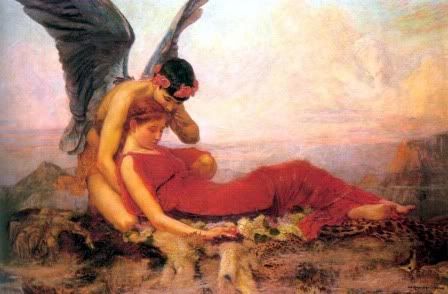Post by bluefedish on Oct 28, 2007 12:05:14 GMT -5
Morpheus ("he who forms, shapes, moulds", from the Greek morphe) is the Greek god of dreams.
Morpheus has the ability to take any human's form and appear in dreams. He is the son of Hypnos, the god of sleep. Nyx (the goddess of night) is his mother/grandmother. The sons of Hypnos — the Oneiroi — are rulers of dreams, and also include Phobetor (also known as Icelus), and Phantasos.
Morpheus is spoken of in the Metamorphoses of Ovid. He sleeps on an ebony bed in a dimly lit cave, surrounded by poppy flowers. According to Ovid, Morpheus concentrated on the human elements of dreams, his brothers Phobetor and Phantasos being responsible for animals and inanimate objects, respectively.
Morpheus sends images of humans in dreams or visions, and is responsible for shaping dreams, or giving shape to the beings which inhabit dreams. Phobetor made fearsome dreams (etymologically related to "phobia" from the Greek word "fear"). Phantasos produced tricky and unreal dreams (hence "fantasy", "phantasmagoria", etc.). Together these sons of Hypnos rule the realm of dreams. Morpheus also had special responsibility for the dreams of kings and heroes. For these reasons Morpheus is often referred to as "Morpheus the Greek god of dreams" in superiority to his brothers.
The drug morphine (once "morphium") derives its name from Morpheus based on its dream-inducing power.
Morpheus is also the name of a musical piece that can be played by a range of instruments, including the clarinet, piano and viola. The piece gives the impressions of nightmares which was obviously inspired by the name of the Greek god of the same name.

Selected Sources:
en.wikipedia.org/wiki/Morpheus_%28mythology%29
www.andrewcollins.com/pics/Morpheus_winged_psyche.jpg
Morpheus has the ability to take any human's form and appear in dreams. He is the son of Hypnos, the god of sleep. Nyx (the goddess of night) is his mother/grandmother. The sons of Hypnos — the Oneiroi — are rulers of dreams, and also include Phobetor (also known as Icelus), and Phantasos.
Morpheus is spoken of in the Metamorphoses of Ovid. He sleeps on an ebony bed in a dimly lit cave, surrounded by poppy flowers. According to Ovid, Morpheus concentrated on the human elements of dreams, his brothers Phobetor and Phantasos being responsible for animals and inanimate objects, respectively.
Morpheus sends images of humans in dreams or visions, and is responsible for shaping dreams, or giving shape to the beings which inhabit dreams. Phobetor made fearsome dreams (etymologically related to "phobia" from the Greek word "fear"). Phantasos produced tricky and unreal dreams (hence "fantasy", "phantasmagoria", etc.). Together these sons of Hypnos rule the realm of dreams. Morpheus also had special responsibility for the dreams of kings and heroes. For these reasons Morpheus is often referred to as "Morpheus the Greek god of dreams" in superiority to his brothers.
The drug morphine (once "morphium") derives its name from Morpheus based on its dream-inducing power.
Morpheus is also the name of a musical piece that can be played by a range of instruments, including the clarinet, piano and viola. The piece gives the impressions of nightmares which was obviously inspired by the name of the Greek god of the same name.

Selected Sources:
en.wikipedia.org/wiki/Morpheus_%28mythology%29
www.andrewcollins.com/pics/Morpheus_winged_psyche.jpg



